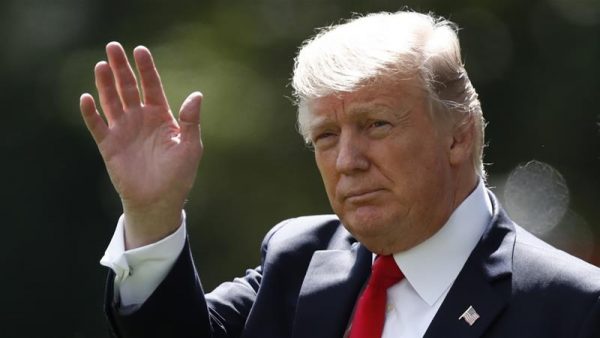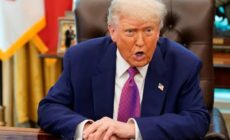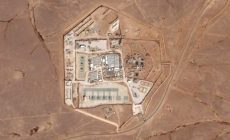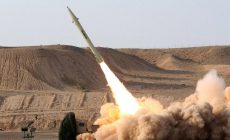For Trump, Tuesday’s speech and the ensuing flurry of diplomacy presents an opportunity to more fully articulate a global agenda that has confounded allies and foes alike.
“The world is still trying to take the measure of this President,” said Jon Alterman, senior vice president at the Center for Strategic and International Studies in Washington. “For a number of leaders, this is going to be their first chance to see him, to judge him, to try to get on his good side … they will have been preparing for a chance encounter for weeks.”
Administration officials say Trump is unlikely to unload on the UN in the way he has in the past. Instead, the President’s aides are preparing an address that largely adheres to tradition by rallying countries behind condemnation of rogue regimes like North Korea and Iran.
Speaking Friday, Trump’s top national security aides previewed a UN message centered on themes of “accountability and sovereignty” over the course of Trump’s four days in New York. The President hopes to relay the message that countries must become more responsible for their own security while signaling the days of US lecturing over issues like human rights are ending.
“He slaps the right people, he hugs the right people, and he comes out with the US being very strong in the end,” Nikki Haley, the US ambassador to the United Nations, said in a preview of Trump’s remarks.
“He will urge all states to come together to address grave dangers that threaten us all,” added H.R. McMaster, the White House national security adviser.
Since taking office, Trump has dug rifts with allies on climate change and trade. But he’s also spoken inconsistently on those issues, fostering a degree of confusion over his stance by issuing vague and sometimes contradictory statements.
In most areas, however, Trump has demonstrated a level of restraint on executing the types of foreign policy shifts that he promised when running for office. He followed the Pentagon’s advice to send additional troops to Afghanistan, despite the urging from some of his conservative advisers to pull out entirely. He’s postponed, at least for now, moving the American embassy in Israel from Tel Aviv to Jerusalem, a campaign promise that would upend his efforts to broker a peace agreement in the region.
And he has yet to discard the Iran nuclear deal, though he is considering steps to weaken it, potentially as early as this month. That issue is expected to dominate parts of Trump’s agenda this week, including talks with Israeli Prime Minister Benjamin Netanyahu on Monday. Iran’s leader, Hassan Rouhani, addresses the UN body on Wednesday.
‘Speed dating from hell’
In New York, Trump will spend the evenings at Trump Tower, his longest stretch at home since taking office in January. He’ll be joined on the trip by Haley, Vice President Mike Pence and Secretary of State Rex Tillerson, each of whom will maintain their own schedules of talks. Tillerson has mandated the State Department reduce its footprint at the General Assembly this year, part of a broader effort to streamline the agency’s activities. The centerpiece diplomatic event is seen as a test of Tillerson as his standing in the administration comes under scrutiny.
Like most years, some major world leaders are sending envoys to the General Assembly instead of attending themselves. China’s Xi Jinping and Russia’s Vladimir Putin are both remaining at home, as is German Chancellor Angela Merkel, who faces reelection next weekend.
But Trump will still convene talks with more than a dozen world leaders over the course of his four-day stay in New York. He will meet individually with the leaders of France, Israel, Jordan, the Palestinian Authority, the United Kingdom, Egypt, Turkey, Afghanistan and Ukraine, the White House said. He’ll meet jointly with the leaders of Japan and South Korea for lunch on Thursday.
And he’ll host two large gatherings for Latin American and African leaders on Monday and Wednesday, respectively.
“It’s kind of like speed dating from hell,” Alterman said of the yearly diplomatic spree.
Trump’s advisers insisted Friday the sessions would be substantive.
“They’re going to find out we are going to be solid, we’re going to be strong,” Haley said. “No one is going to grip and grin. The United States is going to work.”
When President Barack Obama first attended the UN General Assembly in 2009, he was met with widespread adoration from world leaders, who broke protocol by applauding during his largely optimistic address. Eight years later, Obama delivered a far darker speech, implicitly rebuking then-candidate Trump’s views on trade and immigration. Obama himself will deliver rare public remarks in New York on Wednesday.
There are few expectations Trump will be met with similar adulation from the UN body. Trump has largely discounted the United Nations in the past, characterizing the 72-year-old institution as underperforming and overspending. During his presidential run, he impugned the body as “not a friend to freedom.”
Earlier this decade he waged a public battle with the UN after officials refused his offer to oversee renovations of the iconic headquarters building on Manhattan’s East Side. He even sniffed at the Italian marble on the General Assembly hall rostrum, offering on Twitter to “replace (it) with beautiful large marble slabs if they ask me.”
The acrimony dates back to a dispute over the Trump World Tower, once the tallest residential building in the world. UN diplomats, including then-Secretary General Kofi Annan, questioned how Trump secured zoning rights, saying the gray glass skyscraper would cast shadows on the UN headquarters nearby.
Legal challenges were unsuccessful, however, and today Trump’s building stands across the street from the UN garden and a Soviet statue depicting St. George slaying a dragon, titled “Good Defeats Evil.”
 President Donald Trump will tote his “America First” stance this week to the United Nations General Assembly, the annual inundation of diplomats and world leaders who this year await the new US leader with uneasy anticipation.
President Donald Trump will tote his “America First” stance this week to the United Nations General Assembly, the annual inundation of diplomats and world leaders who this year await the new US leader with uneasy anticipation.









 (Selorm) |
(Selorm) |  (Nana Kwesi)
(Nana Kwesi)